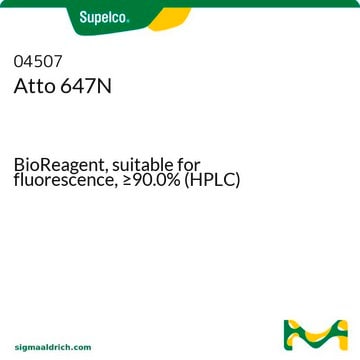49728
Atto 620 maleimide
suitable for fluorescence
Iniciar sesiónpara Ver la Fijación de precios por contrato y de la organización
About This Item
UNSPSC Code:
12352111
NACRES:
NA.32
Productos recomendados
assay
≥80% (coupling to thiols)
Quality Level
form
solid
manufacturer/tradename
ATTO-TEC GmbH
fluorescence
λex 619 nm; λem 643 nm in 0.1 M phosphate pH 7.0
suitability
suitable for fluorescence
storage temp.
−20°C
General description
Atto 620 belongs to a new generation of fluorescent labels for the red spectral region. The dye is designed for application in the area of life science, e.g. labelling of DNA, RNA or proteins. Characteristic features of the label are strong absorption, temperature dependent fluorescence, high thermal and photo-stability, good water
solubility, and very little triplet formation. Atto 620 is a cationic dye. After coupling to a substrate the dye carries a net electrical charge of +1. In common with most Atto-labels, absorption and fluorescence are independent of pH, at least in the range of pH 2 to 11, used in typical applications.
find more information here
solubility, and very little triplet formation. Atto 620 is a cationic dye. After coupling to a substrate the dye carries a net electrical charge of +1. In common with most Atto-labels, absorption and fluorescence are independent of pH, at least in the range of pH 2 to 11, used in typical applications.
find more information here
Packaging
Bottomless glass bottle. Contents are inside inserted fused cone.
Legal Information
This product is for Research use only. In case of intended commercialization, please contact the IP-holder (ATTO-TEC GmbH, Germany) for licensing.
Storage Class
11 - Combustible Solids
wgk_germany
WGK 3
flash_point_f
Not applicable
flash_point_c
Not applicable
Certificados de análisis (COA)
Busque Certificados de análisis (COA) introduciendo el número de lote del producto. Los números de lote se encuentran en la etiqueta del producto después de las palabras «Lot» o «Batch»
¿Ya tiene este producto?
Encuentre la documentación para los productos que ha comprado recientemente en la Biblioteca de documentos.
Maria Strianese et al.
Inorganic chemistry, 51(21), 11220-11222 (2012-10-18)
Fluorescently labeled cobalt peptide deformylase (Co-PDF) can be efficiently used as a fluorescence-resonance-energy-transfer-based sensing device for hydrogen sulfide (H(2)S). The proof of concept of our sensor system is substantiated by spectroscopic, structural, and theoretical results. Monohydrogen sulfide coordination to Co-PDF
Maria Strianese et al.
Journal of inorganic biochemistry, 104(6), 619-624 (2010-03-23)
In this paper we explore the use of fluorescently labeled cytochrome c peroxidase (CcP) from baker's yeast for monitoring nitric oxide (NO) down to the sub-micromolar level, by means of a FRET (Förster Resonance Energy Transfer) mechanism. The binding affinity
Peter P T Surawski et al.
Molecular bioSystems, 4(7), 774-778 (2008-06-20)
The concept of optically encoding particles for solid phase organic synthesis has existed in the literature for several years. However, there remains a significant challenge to producing particles that are capable of withstanding harsh solvents and reagents whilst maintaining the
Darby Kozak et al.
Langmuir : the ACS journal of surfaces and colloids, 24(4), 1204-1211 (2007-12-11)
This study presents the use of flow cytometry as a high-throughput quantifiable technique to study multicomponent adsorption interactions between proteins and surfaces. Flow cytometry offers the advantage of high-throughput analysis of multiple parameters on a very small sampling scale. This
Nuestro equipo de científicos tiene experiencia en todas las áreas de investigación: Ciencias de la vida, Ciencia de los materiales, Síntesis química, Cromatografía, Analítica y muchas otras.
Póngase en contacto con el Servicio técnico



